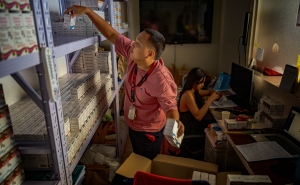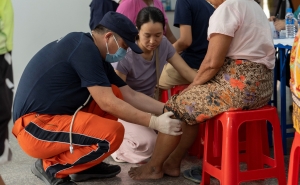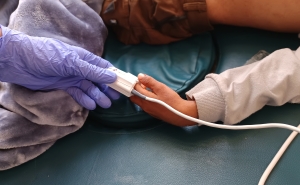The Impact of Gender on the Global Polio Eradication Initiative: Key Findings
A new study conducted by faculty in the Johns Hopkins Bloomberg School of Public Health examined how gender power dynamics—the role gender plays in affecting the distribution of power in a given environment or relationship—influenced the implementation of the Global Polio Eradication Initiative (GPEI) across global, national, subnational, and front-line levels in seven countries: Afghanistan, Bangladesh, Democratic Republic of the Congo, Ethiopia, India, Indonesia, and Nigeria. The study found that gender power dynamics played an important role at home and in the community, in the workplace, and in the GPEI organization itself. The impacts in these areas affected the successful execution of the GPEI’s aim to eradicate polio through vaccination.
Key findings regarding the role that gender played in the GPEI include:
- The effect of gender on who receives the vaccine: In some contexts, including within Ethiopia and regions of India, and Afghanistan, the health of boys was prioritized over girls and more boys received the vaccine. In other contexts, however, misconceptions about the vaccine, such as that it would cause sterility in boys, caused more girls than boys to receive the vaccine.
- The effect of gender on the successful administration of the vaccine: In many contexts, male polio workers were not allowed to enter households, creating a need to recruit and train female workers who could access homes in conservative areas to administer the vaccine. This increased the number of households reached, but also left areas that are unsafe for women or where women are not allowed to go unreached and thus unvaccinated.
- The impact of having females as front-line workers on the community: The use of females as front-line workers delivering the vaccine resulted in the empowerment of women in communities where employment for women was limited, and for many, this was their first opportunity to gain employment in their lives. Female workers were also more likely to be trusted by communities. They were also were able to help other women in the households they visited by raising awareness on other health issues such as intimate partner violence.
- The effect of gender at work: Having more female front-line health care workers changed the dynamics of program teams. Since all-male teams were limited in their ability to effectively reach households, there was a need for mixed gendered teams that included both men and women. This maximized access to the communities and in some situations, helped ensure safety of female workers.
- The effect of gender on the organization of the Global Polio Eradication Initiative: While women were increasingly engaged for front-line worker positions, there was not a similar emphasis on promoting women to leadership roles, particularly at the global level. One participant said, “It’s one of the most male-dominated global programs I’ve ever seen.” This has been reflected in the leadership of the GPEI globally and within countries.
The study was conducted by the Synthesis and Translation of Research and Innovations from Polio Eradication (STRIPE) project, which seeks to map, synthesize, and disseminate knowledge and lessons learned from the global polio eradication effort. The key findings from this study demonstrate the important role that gender power relations play in the success of global health programs. Without careful consideration of gender, global health programs may fail to meet their required targets or further reinforce gender inequality.
The STRIPE project is funded by the Bill & Melinda Gates Foundation. For more information on study design, key findings, and recommendations going forward, read The influence of gender dynamics on polio eradication efforts at the community, workplace, and organizational level, which was published in Global Health Research and Policy on June 29, 2021.





